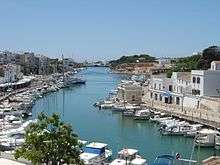Ciutadella de Menorca
| Ciutadella de Menorca | ||
|---|---|---|
| Municipality | ||
.jpg) | ||
| ||
 Ciutadella de Menorca Location in Spain | ||
| Coordinates: 40°01′N 3°49′E / 40.017°N 3.817°E | ||
| Country |
| |
| Autonomous community |
| |
| Province | Balearic Islands | |
| Judicial district | Ciutadella | |
| Government | ||
| • Mayor | Pilar Carbonero Sánchez | |
| Area | ||
| • Total | 186.34 km2 (71.95 sq mi) | |
| Elevation | 24 m (79 ft) | |
| Population (2009) | ||
| • Total | 29,160 | |
| • Density | 160/km2 (410/sq mi) | |
| Time zone | CET (UTC+1) | |
| • Summer (DST) | CEST (UTC+2) | |
| Postal code | 07760, 07769 | |
|
www | ||
Ciutadella de Menorca (Catalan pronunciation: [siwtəˈðeʎə ðə məˈnɔrkə]) or simply Ciutadella is a town and a municipality in the western end of Menorca, one of the Balearic Islands (Spain). It is one of the two primary cities in the island, along with Maó.
History

It was founded by the Carthaginians, and became the seat of a bishop in the 4th century. After being governed by the Moors under the names of Medīna el Jezīra (Arabic: مدينة الجزيرة) and Medīna Menūrqa (مدينة منورقة) for several centuries, Citadel was recaptured during the reconquista by men serving Alfonso III and became part of the Crown of Aragon. During the Middle Ages, it became an important trading center.
On 9 July 1558, the Turks under Piyale Pasha and Turgut Reis with a powerful Turkish Armada of 140 ships and 15,000 soldiers, put the town under siege for eight days entered and decimated the town. The town was defended by only a few hundred men. All of Ciutadella's 3,099 inhabitants who survived the siege were taken as slaves to Turkey together with other inhabitants of surrounding villages. In total, 3,452 residents were sold into slavery in the slave markets of Istanbul (Constantinople), Turkey.
An obelisk was set up in the 19th century by Josep Quadrado in the Plaza d'es Born in memory of the offensive, with the following inscription:
Here we fought until death for our religion and our country in the year 1558[1][2]
Every year on July 9, a commemoration takes place in Ciutadella, remembering "l’Any de sa Desgràcia", or "the Year of the Disaster".[3]
Religion
Despite no longer being Minorca's capital, Ciutadella has remained the island's religious center as the Bishop refused to move. The festival of Saint John, its patron saint, takes place each year on 23 and 24 of June. The Cathedral of Minorca, located in the old quarter of Ciutadella, was built in 1287 on the foundation of an older mosque.
Main sights

In the 17th century, many of Ciutadella's civil and religious buildings were built in the Italian style and gave it a historical and artistic unity.
Ciutadella's town hall is the former palace of the Arab governor and later served as a royal palace under the Crown of Aragon and again as a governor's palace until the British moved the capital to the eastern town of Mahon in 1722.
Punta Nati Lighthouse is located due north of Ciutadella.
Sister cities
| Wikimedia Commons has media related to Ciutadella de Menorca. |
 Córdoba, Spain
Córdoba, Spain Oristano, Italy, since 1991
Oristano, Italy, since 1991 Long Beach Island, New Jersey, United States, since 2012
Long Beach Island, New Jersey, United States, since 2012
Notes
- ↑ Lee, Phil, The rough guide to Mallorca & Menorca (New York, 2004), p. 171.
- ↑ "In the middle soars an obelisk commemorating the futile defence against the Turks in 1558, a brutal episode that was actually something of an accident. The Ottomans had dispatched 15000 soldiers and 150 warships west to assist their French allied against the Habsburg": Lee, p. 171 ff.
- ↑ Balears Cultural Tour
.svg.png)